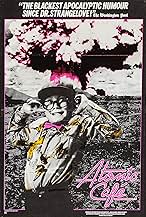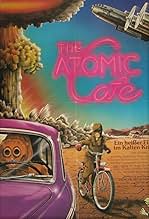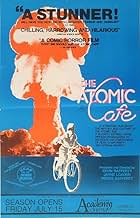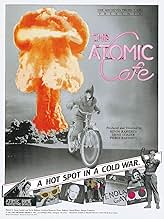VALUTAZIONE IMDb
7,6/10
4741
LA TUA VALUTAZIONE
Aggiungi una trama nella tua linguaDisturbing collection of 1940s and 1950s United States government-issued propaganda films designed to reassure Americans that the atomic bomb was not a threat to their safety.Disturbing collection of 1940s and 1950s United States government-issued propaganda films designed to reassure Americans that the atomic bomb was not a threat to their safety.Disturbing collection of 1940s and 1950s United States government-issued propaganda films designed to reassure Americans that the atomic bomb was not a threat to their safety.
- Nominato ai 1 BAFTA Award
- 2 vittorie e 1 candidatura in totale
Paul Tibbets
- Self
- (filmato d'archivio)
Harry S. Truman
- Self
- (filmato d'archivio)
- (as President Harry S Truman)
W.H.P. Blandy
- Self - Commander of the Bikini Test
- (filmato d'archivio)
- (as Vice Admiral W.H.P. Blandy)
Brien McMahon
- Self
- (filmato d'archivio)
- (as Sen. Brian McMahon)
Lloyd Bentsen
- Self
- (filmato d'archivio)
- (as Rep. Lloyd Bentsen)
Owen Brewster
- Self
- (filmato d'archivio)
- (as Sen. Owen Brewster)
Julius Rosenberg
- Self
- (filmato d'archivio)
Ethel Rosenberg
- Self
- (filmato d'archivio)
Val Peterson
- Self - Director of Civil Defense
- (filmato d'archivio)
- (as Gov. Val Peterson)
Lyndon B. Johnson
- Self
- (filmato d'archivio)
- (as Sen. Lyndon B. Johnson)
Lewis Strauss
- Self - Chairman, Atomic Energy Commission
- (filmato d'archivio)
- (as Lewis L. Strauss)
George Molan
- Self
- (filmato d'archivio)
- (as Cpl. George Molan)
George Portell
- Self
- (filmato d'archivio)
- (as Tech Sgt. George Portell)
Jerry Schneider
- Self
- (filmato d'archivio)
Sergeant Weaver
- Self
- (filmato d'archivio)
Seymour Melman
- Self - Columbia University
- (filmato d'archivio)
- (as Prof. Seymour Melman)
Mario Salvadori
- Self - Columbia University
- (filmato d'archivio)
- (as Prof. Mario Salvadori)
Nikita Khrushchev
- Self
- (filmato d'archivio)
Recensioni in evidenza
I saw The Atomic Cafe in a theater when it was first released. Someone exclaimed derogatorily as they walked out on it. But I thought it was brilliant. Sort of a sub-genre of documentary, this one had no commentary, narrative or explanations for the material presented. No retroactive interviews with those who were there. It relied 100% on archival materials.
A few years back, I visited the Trinity Site (here in New Mexico) on the 50th anniversary of the first test of the bomb. Quite a few of those who were somehow involved back then and still living turned up for the event. So I did get to hear some hindsight comments. Definitely different than what was being said back then, and such commentary could have really changed the picture.
This is a rare approach, and therefore thought provoking. One can argue that the choice of material, editing and music track impose some interpretation, and there may be something to that. Although it's unlikely that one could turn the story into something really different unless latter-day, hindsight interviews were added to provide a different spin.
Being a "Baby Boomer", I was born during the times depicted in the movie, and have some early memories of them. For those who were alive in that time, it's fascinating to see how it tweaks your memory. I, for one, didn't think deep thoughts about the "duck and cover" drills at school - it was just another thing that got us out of our seats, like fire drills and recess. But it does tweak memory, to bring back things not thought of for many years. Interesting to consider how one's own memory is incomplete, wanders, can be influenced, etc. (Now, re-read Orwell's 1984.)
Brilliant, and disturbing. Interesting to consider in light of current events (spring 2003).
A few years back, I visited the Trinity Site (here in New Mexico) on the 50th anniversary of the first test of the bomb. Quite a few of those who were somehow involved back then and still living turned up for the event. So I did get to hear some hindsight comments. Definitely different than what was being said back then, and such commentary could have really changed the picture.
This is a rare approach, and therefore thought provoking. One can argue that the choice of material, editing and music track impose some interpretation, and there may be something to that. Although it's unlikely that one could turn the story into something really different unless latter-day, hindsight interviews were added to provide a different spin.
Being a "Baby Boomer", I was born during the times depicted in the movie, and have some early memories of them. For those who were alive in that time, it's fascinating to see how it tweaks your memory. I, for one, didn't think deep thoughts about the "duck and cover" drills at school - it was just another thing that got us out of our seats, like fire drills and recess. But it does tweak memory, to bring back things not thought of for many years. Interesting to consider how one's own memory is incomplete, wanders, can be influenced, etc. (Now, re-read Orwell's 1984.)
Brilliant, and disturbing. Interesting to consider in light of current events (spring 2003).
THE ATOMIC CAFE is one of those few rare documentaries that doesn't have a narrator or a framing figure . All it consists of are clips in a chronological order of the history of the atomic bomb and of the early stages of the geo-political situation of what became known as " The Cold War " which was the direct result of the bomb . There's two ways of looking at this . One is the subject matter is a little bit dry and absurd and the second point of view of view is that the audience are allowed to make up there own mind and it's somewhat refreshing to see a documentary that doesn't involve someone bludgeoning the audience over the head while sticking their opinions down their throat in a painfully smug and snide manner . You can tell this wasn't made by Michael Moore
One wonders what life was like in a pre-nuclear age ? I remember the cold war in the 1980s and the paranoia of that era was chilling , so much so that for people of my generation still refer to the 1984 BBC docu-drama THREADS as the most terrifying thing they have ever seen . That said it could also be argued that if it wasn't for the bomb then a conventional war that would have surpassed the death toll of the second world war might have broken out between 1945 and the collapse of the Soviet Union in 1991 . Reagen in The White House and Brezhnev in the Kremlin ? Not really a recipe for peace and the fact that nuclear weapons are so terrible to contemplate probably focused the minds of world leaders
Being an American documentary all the clips are from an American point of view with an exception of a clip that's almost certainly from an early edition of PANORAMA from the BBC . This is a pity because I would liked to have seen what sort of propaganda if any the USSR was producing at the same time . That said the old cliché of " Americans don't understand irony " is evident as someone praises the virtues of American freedom " because we have shopping malls that are full of food and clothes and most families can afford cars " . I think someone is confusing system of government with economics .As I write this in 2014 China has shopping malls full of food and clothes and the Chinese people can afford to drive cars . The difference is there's no democratic system of government in China so democracy and capitalism are not the one and the same thing , but I guess that clip is to illustrate the inherent absurdity of propaganda ? Likewise we get clips of real life footage of American servicemen being used to test the effects of being caught in an atomic blast " There's nothing to worry about " and of relaxing should your city be caught up in a nuclear war . Did someone say " Absurd ? "
One very interesting point that is often talked about by the CND mob is in relation to the bombing of Hiroshima and Nagasaki as in " Why didn't the Americans drop the bombs in a remote unpopulated area of Japan to force their surrender ? " I've often thought that myself and am unable to give a counter argument to that question . Here we see an interview with Paul Tibbets the pilot who dropped the bomb on Hiroshima who goes in to some detail - it's because these cities were untouched by arial bombing and the American government wanted to study the effects on a bombed city after the war had ended . Some people might think this is amoral or cruelly cynical but you can make up your own mind as to morality during wartime and THE ATOMIC CAFE does allow the audience to think for themselves no matter what the opinions of this documentary's producers are . In that respect it's very refreshing
One wonders what life was like in a pre-nuclear age ? I remember the cold war in the 1980s and the paranoia of that era was chilling , so much so that for people of my generation still refer to the 1984 BBC docu-drama THREADS as the most terrifying thing they have ever seen . That said it could also be argued that if it wasn't for the bomb then a conventional war that would have surpassed the death toll of the second world war might have broken out between 1945 and the collapse of the Soviet Union in 1991 . Reagen in The White House and Brezhnev in the Kremlin ? Not really a recipe for peace and the fact that nuclear weapons are so terrible to contemplate probably focused the minds of world leaders
Being an American documentary all the clips are from an American point of view with an exception of a clip that's almost certainly from an early edition of PANORAMA from the BBC . This is a pity because I would liked to have seen what sort of propaganda if any the USSR was producing at the same time . That said the old cliché of " Americans don't understand irony " is evident as someone praises the virtues of American freedom " because we have shopping malls that are full of food and clothes and most families can afford cars " . I think someone is confusing system of government with economics .As I write this in 2014 China has shopping malls full of food and clothes and the Chinese people can afford to drive cars . The difference is there's no democratic system of government in China so democracy and capitalism are not the one and the same thing , but I guess that clip is to illustrate the inherent absurdity of propaganda ? Likewise we get clips of real life footage of American servicemen being used to test the effects of being caught in an atomic blast " There's nothing to worry about " and of relaxing should your city be caught up in a nuclear war . Did someone say " Absurd ? "
One very interesting point that is often talked about by the CND mob is in relation to the bombing of Hiroshima and Nagasaki as in " Why didn't the Americans drop the bombs in a remote unpopulated area of Japan to force their surrender ? " I've often thought that myself and am unable to give a counter argument to that question . Here we see an interview with Paul Tibbets the pilot who dropped the bomb on Hiroshima who goes in to some detail - it's because these cities were untouched by arial bombing and the American government wanted to study the effects on a bombed city after the war had ended . Some people might think this is amoral or cruelly cynical but you can make up your own mind as to morality during wartime and THE ATOMIC CAFE does allow the audience to think for themselves no matter what the opinions of this documentary's producers are . In that respect it's very refreshing
The older boomers would recall the atmosphere of this era very well.
The belief that nuclear weapons were probably going to fall at any time was accepted as a matter of course. Coming out of the carnage and rubble of WW2 perhaps that was to be expected, but the PSAs and political leaders honed that message to suggest it was not much more of a concern than a flock of tornadoes. "Duck and Cover" ads, back yard bomb shelters, Conelrad symbols on the radios (AM of course), public fallout shelters in the bank basements and other related markers were given little thought.
Younger folks would get a kick out of the over-simplified logic and ham-handed propaganda and be astonished to think that we took it for granted that nuclear warfare was just a dirty conventional tactic similar to the London Blitz.
It is an informative film and very entertaining in its odd way. Worth a watch for interested parties.
The belief that nuclear weapons were probably going to fall at any time was accepted as a matter of course. Coming out of the carnage and rubble of WW2 perhaps that was to be expected, but the PSAs and political leaders honed that message to suggest it was not much more of a concern than a flock of tornadoes. "Duck and Cover" ads, back yard bomb shelters, Conelrad symbols on the radios (AM of course), public fallout shelters in the bank basements and other related markers were given little thought.
Younger folks would get a kick out of the over-simplified logic and ham-handed propaganda and be astonished to think that we took it for granted that nuclear warfare was just a dirty conventional tactic similar to the London Blitz.
It is an informative film and very entertaining in its odd way. Worth a watch for interested parties.
The fact that this is true makes this short film scary and worrying...but doesn't stop it from being very entertaining and funny. The pieces of real life propaganda are amazing and it's often hard to believe that it's all true.
However remember that all of the snipets of film are cut and pasted together with music added over the top, so everything you see isn't exactly as it seems... it's propaganda on propaganda...and highly entertaining. A must see for any one interested in American History, Propaganda, or just wanting a good sorry laugh.
However remember that all of the snipets of film are cut and pasted together with music added over the top, so everything you see isn't exactly as it seems... it's propaganda on propaganda...and highly entertaining. A must see for any one interested in American History, Propaganda, or just wanting a good sorry laugh.
10enmussak
For anyone who enjoys a real sense about times in history that they have not lived through, this is an excellent film. I had no idea how the dawning of the atomic age changed American culture. For an interesting continuance of the paranoid atomic era, check out Bowling for Columbine. Both Atomic Cafe and Bowling for Columbine discuss the "Culture of Fear" that is America.
Some of the content in the Atomic Cafe is completely shocking, which serves its purpose as a poignant exposé into one of the darker periods of America's (if not the world's history). A must see. You'll be glued to the screen. 10/10
Some of the content in the Atomic Cafe is completely shocking, which serves its purpose as a poignant exposé into one of the darker periods of America's (if not the world's history). A must see. You'll be glued to the screen. 10/10
Lo sapevi?
- QuizThe segment "Duck and Cover" showed how school children were reassured by "Bert the Turtle" that they would survive a nuclear bomb by simply forming a huddle together by the wall of the school-house. "The Atomic Cafe" has been attributed to raising public consciousness of the short film "Duck and Cover" and introducing it to a whole a new generation.
- Citazioni
Army information film: When not close enough to be killed, the atomic bomb is one of the most beautiful sights in the world.
- Colonne sonoreWhen the Atom Bomb Fell
Written by Karl Victor Davis and Connecticut 'Harty' Taylor
Performed by Karl and Harty
Courtesy of CBS Records, Inc.
I più visti
Accedi per valutare e creare un elenco di titoli salvati per ottenere consigli personalizzati
- How long is The Atomic Cafe?Powered by Alexa
Dettagli
Botteghino
- Budget
- 300.000 USD (previsto)
- Lordo Stati Uniti e Canada
- 22.293 USD
- Fine settimana di apertura Stati Uniti e Canada
- 4098 USD
- 5 ago 2018
- Lordo in tutto il mondo
- 22.293 USD
- Tempo di esecuzione
- 1h 26min(86 min)
- Colore
- Mix di suoni
- Proporzioni
- 1.33 : 1
Contribuisci a questa pagina
Suggerisci una modifica o aggiungi i contenuti mancanti





























